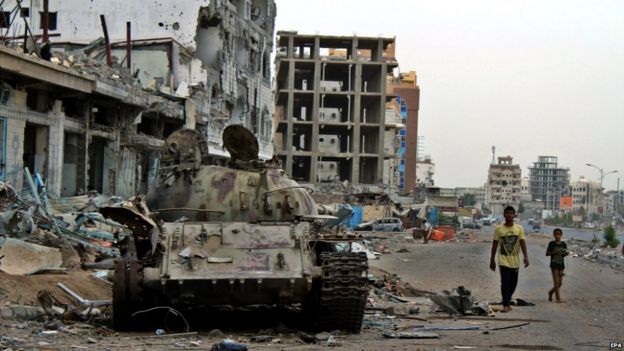Yemen crisis: Famine threatens war-torn country, warns UN
By BBC News
Yemen's conflict has left it on the brink of famine, the UN's World Food Programme (WFP) has warned.
Food shortages, lack of fresh water, and low fuel stocks have created a "perfect storm" for the Yemeni people, the WFP's Ertharin Cousin said.The organisation estimates nearly 13 million people urgently require help.
The conflict has involved Houthi rebel fighters clashing with forces loyal to the Yemeni government and its allies, led by Saudi Arabia.
Ms Cousin, who was speaking after a three-day trip to Yemen. said aid agencies were unable to reach areas of need because of the ongoing violence.
Yemen Crisis
Four months of fighting between Houthi rebels and government forces, and Saudi-led coalition air strikes, have left the impoverished country in chaos
- 80% of the population need aid
- 13m people face food shortages
- 1.4m forced from their homes
- 2,000 civilians killed
A recent WFP assessment of food security on the ground concluded Yemen was "one step away" from famine.
In the latest violence, a bomb exploded next to the governor's office in the southern city of Aden, killing four people.
Sally Nabil, BBC correspondent in Aden
Although the fighting is over, the humanitarian situation in Aden remains dire. Pro-government forces have driven out the Iranian-backed Houthi rebels but the people are in desperate need.Many of the residential neighbourhoods have been reduced to ruins and thousands of Yemenis are still living in schools and mosques, with little access to food, water or medicine. There is no sign they are going to return home any time soon.
A lot of areas around the city are full of landmines and explosive devices. One lady told me her neighbour went back to check his house after the fighting stopped, but the moment he opened the door an explosion was triggered. She said she doesn't want to face the same fate.
As we walked around Aden, we saw some neighbourhoods overflowing with sewage water. Parents say their children are suffering from malaria, diarrhoea and skin diseases.
Hospitals are overwhelmed with war casualties who don't receive adequate medical treatment. Many die on their way to the medical facilities because ambulances are poorly equipped. Doctors say many victims need to be taken abroad because their conditions are too serious to be treated in Yemen.
Meanwhile, UN humanitarian chief Stephen O'Brien, who has also just returned from Yemen, told the UN Security Council on Wednesday that "the scale of human suffering is almost incomprehensible".
He also strongly criticised the Saudi-led coalition in Yemen for bombing the port of Hodeida, saying it was a violation of international humanitarian law.

"I am extremely concerned that the damage to the port of Hodeida could have a severe impact on the entire country and will deepen humanitarian needs," Mr O'Brien said.
The UN has raised Yemen to its highest level of humanitarian crisis, placing it alongside emergencies in South Sudan, Syria and Iraq.
Nearly 2,000 civilians are said to have died since the coalition began its bombing campaign in support of the exiled government in March.
As grim as the humanitarian situation is in Yemen, the WFP stops short of declaring a famine there in its latest update.
The UN uses the term sparingly and will only declare a famine once certain conditions are met.
They are: over 20% of households in an area face extreme food shortages with a limited ability to cope; acute malnutrition rates exceed 30%; and the death rate exceeds two per day per 10,000 people.
Calling the situation in Yemen a famine would instantly raise awareness, but that labelling makes little difference to the Yemeni people already suffering.
The UN says a "humanitarian catastrophe" is under way, and has called for urgent support from donors.


0 Comments:
Post a Comment
Subscribe to Post Comments [Atom]
<< Home